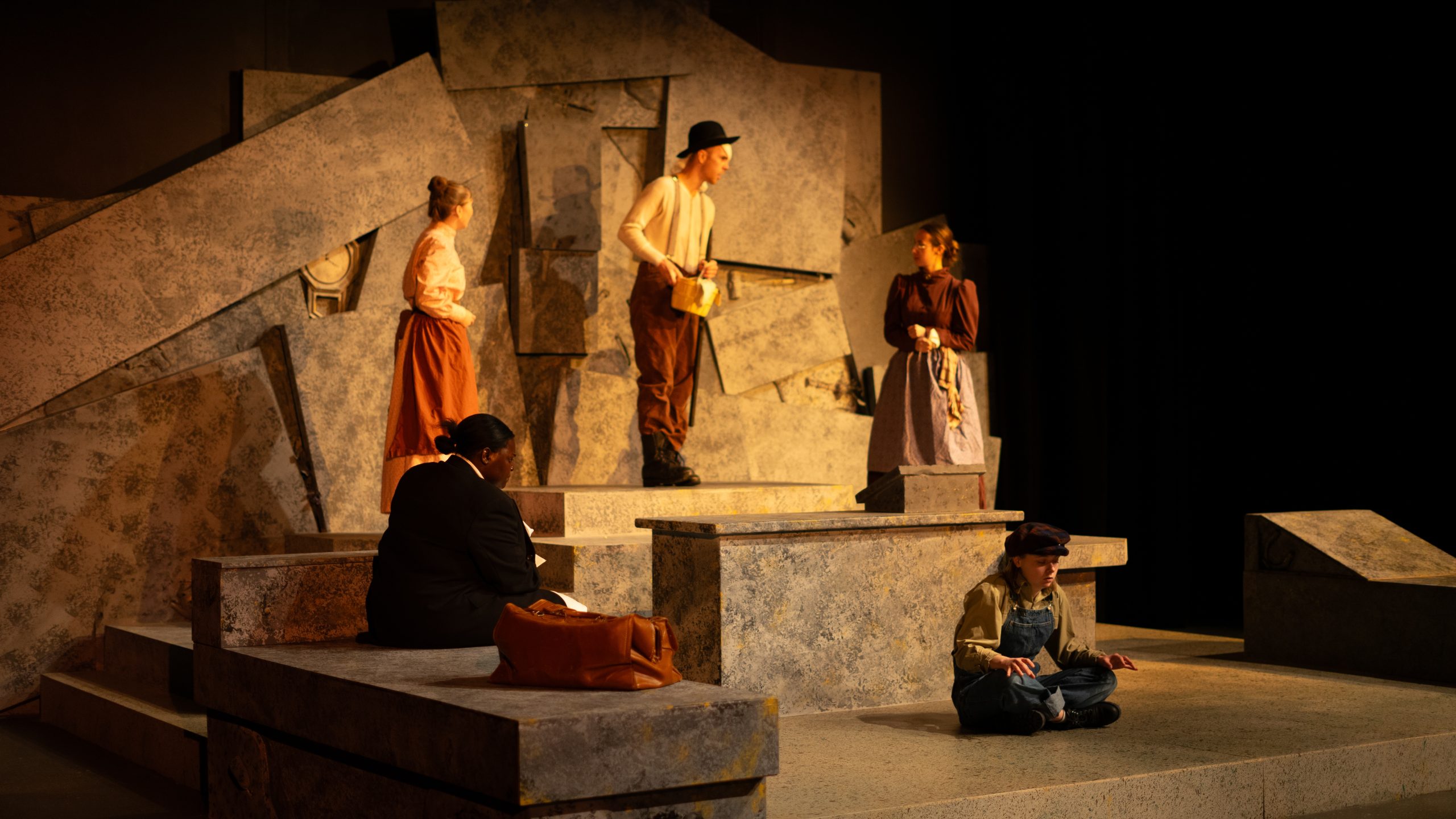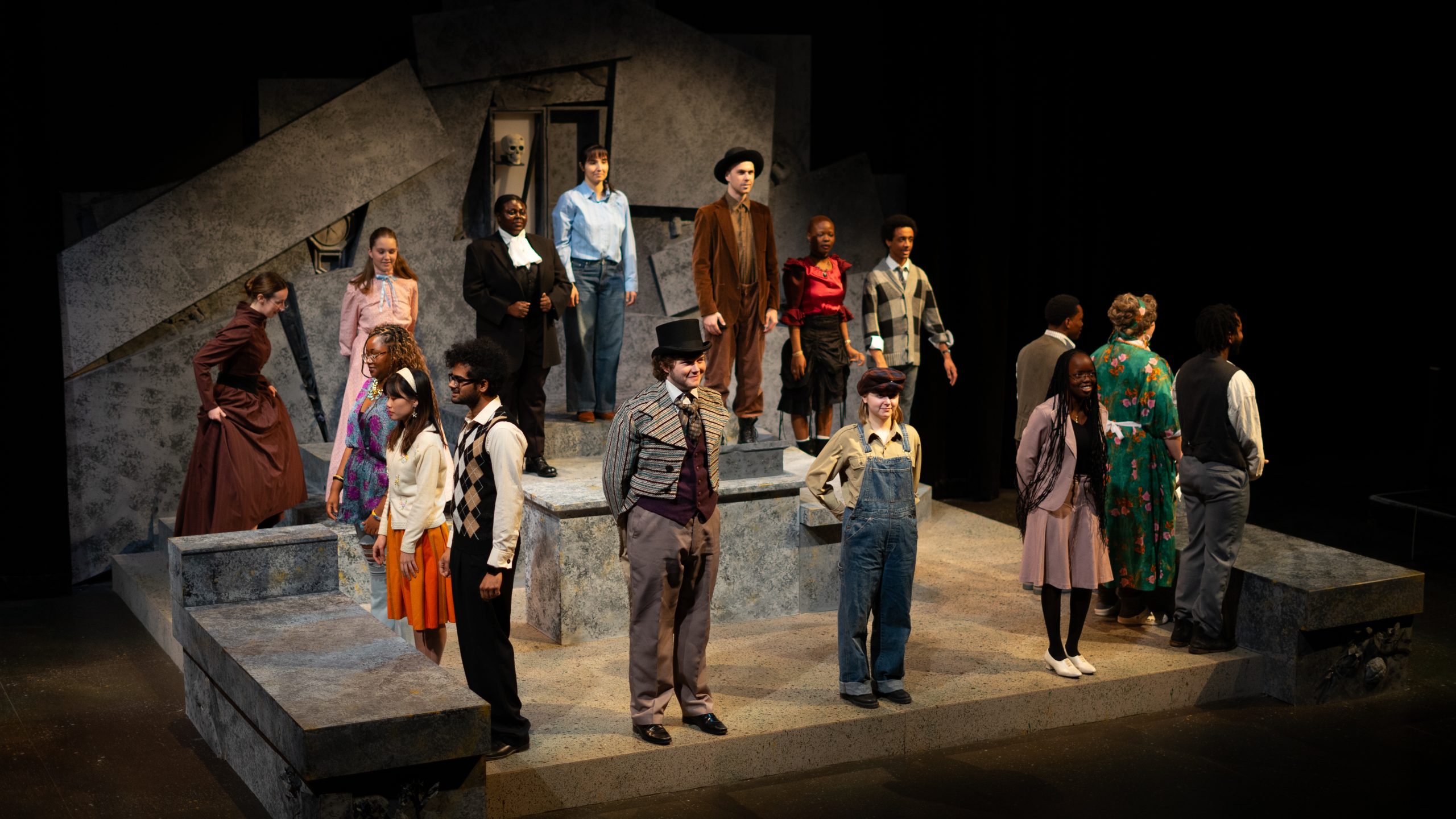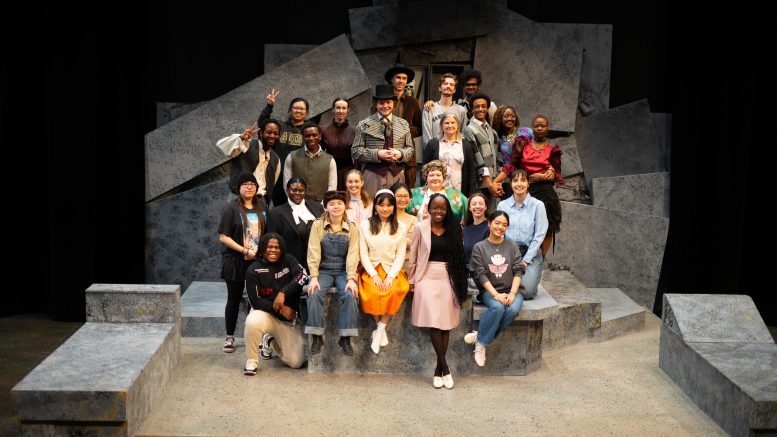Presented by the department of English, theatre, film and media, students in THTR 3000 (special topics in theatre production) are bringing That Elusive Spark to life in the John J. Conklin Theatre on campus.
Dr. Katrina Dunn, an associate professor in the department and coordinator of the theatre program, served as the director of the production. Dunn admitted that it is difficult to summarize the 95-minute production into a soundbite but mentioned that the production is about “people struggling with brain change and personality change — which sometimes we might call mental health issues.”
That Elusive Spark follows three throughlines which all intersect on that theme, according to Dunn.
One throughline, the contemporary story, follows neuropsychologist Dr. Helen Harlow who has a new university teaching position, but who has recently lost her father under tragic circumstances.
Dunn explained that Harlow is walking into her first job without being in her best place and finds the pressure too much to bear. The story is about the struggles of an instructor who also encounters students that are dealing with mental health issues. Harlow struggles to assist the students as she herself attempts to manage her own mental health challenges.
The second throughline, set in 1848, entails Helen Harlow’s ancestor whose research on Phineas Gage forms the basis of her research. The story follows the true story of Gage, a blasting foreman on railway construction projects in the United States. Gage was tasked with tamping down explosives in the ground to blast away the rock with a tampering iron — a large iron rod.

Following an accident, the iron rod was shot through Gage’s cheek and exited through the top of his head — destroying much of his left frontal lobe. Gage could walk and talk within minutes after the accident, and would survive for another 12 years, described as a medical marvel, but was noted to have undergone a profound personality change. Dunn stated that the production follows his accident, how his relationships were impacted and the remainder of his life.
The third and final throughline pertains to Shakespeare’s play Hamlet.
Dunn mentioned that Harlow’s father was also a researcher, professor and an expert of Hamlet. “Because of him and his research, there are echoes of Hamlet all throughout this play,” stated Dunn. She mentioned that the story of Ophelia in Hamlet stands out in particular, who was also someone that had a mental health crisis and who ultimately took her own life.
That Elusive Spark was written as a play originally in 2005 by Janet Munsil for an acting class at the University of Victoria. Dunn mentioned that she collaborated with Munsil to “decompress” the play up to a bigger cast and update it with information that we now know.
“We did the redrafting of the script and the set design all through May-June. I contacted the students the week before school started and asked them to read the script and voice which characters they were interested in potentially playing and what production roles they wanted to do,” said Dunn. “That’s kind of all that happened in advance.
“Once classes happened, we auditioned very quickly in the first three days of the first week. By Monday of the second week, we had everything cast and all the roles assigned and we just started rehearsing,” she stated.
“So, it all kicks off pretty quickly […] in order to actually fit the rehearsal time required to get a show like this ready for opening night, we really have to be economical with our time.”
Dunn indicated that for years, productions at the U of M were mainly done as extracurricular activities, though this is the first time it was tried as a course on campus.
“In the last couple of years, the university has been asking that we turn that into course work. So, this year, we did,” said Dunn. “What you see on stage there is a course […] they’re all enrolled in a three-credit course [THTR 3000] whose only task is to produce this play.”
Dunn noted that unlike other courses, continual in-person attendance is critical to ensure that scenes can be rehearsed. “If you don’t come to rehearsal, it becomes really tricky for the other people who are trying to work.”

Kezia Obaseki, a student who plays Helen Harlow’s ancestor during the 1848 timeline, Dr. John Harlow, described the production as “an amazing show that also speaks on student mental health.”
When asked about the production’s takeaway message, Obaseki said, “your mental health matters to everybody around you, and it’s okay for you to want to be in your shell. It’s okay for you not to understand what you’re going through.
“Just know that there’s resources, especially here at the U of M, there’s resources that have been put out and are set in place to help every student […] there are people out there who care and want to listen to what you have to say and who are willing to help you.”
Dunn indicated that one of the most rewarding attributes of the production is knowing how engaged and resourceful students become.
“And also the teamwork, it teaches you to collaborate, because every aspect of theatre work is collaborative,” said Dunn.
“I think regular coursework is not normally like that. It’s usually pretty singular and individually driven. Everything you do in a theatre course is with someone else. I think those are really good skills that we need to keep top-of-mind as we get more and more isolated in our online kind of world.”
That Elusive Spark is showcased in the John J. Conklin Theatre located in the Taché Hall Arts Complex. Showtimes are Nov. 27-29 at 7 p.m., Nov. 30 at 2 p.m. and 7 p.m. and Dec. 2 at 2 p.m. Tickets can be purchased online through Eventbrite for $10 plus fees.





